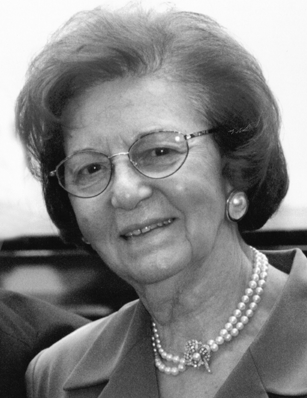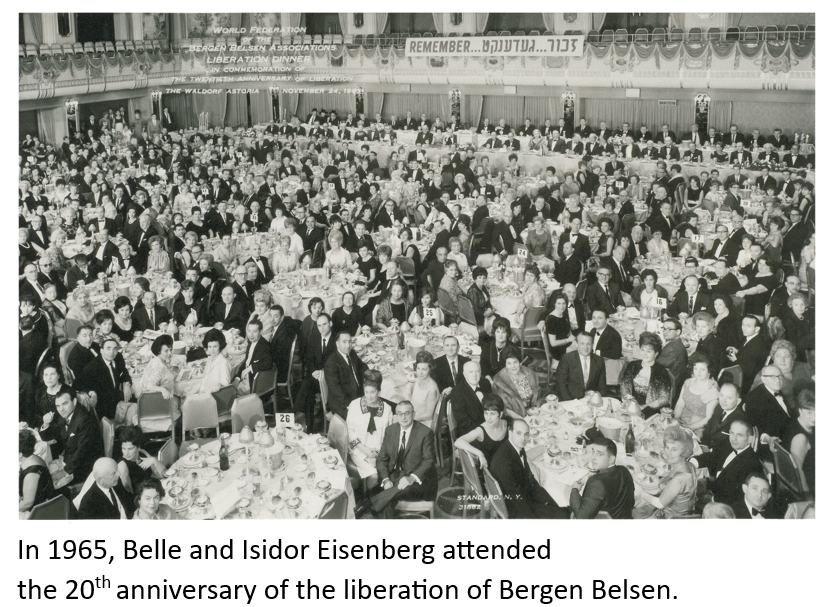Belle Eisenberg
"People are human. We need to be more tolerant. We cannot forget the past. What I am telling you of Jewish history is documented. If you forget the past, you cannot function in the future. "
Name at birth
Bela Rubin
Date of birth
01/10/1921
Where did you grow up?
Mechuv until I was 16 years old, then my family and I moved to Sosnowiec
Name of father, occupation
Mordechai Rubin,
Owner, dry goods store
Maiden name of mother, occupation
Shaindel,
Homemaker
Immediate family (names, birth order)
Parents, me and younger brother Hertzl
How many in entire extended family?
70
Who survived the Holocaust?
Only my father and I survived the war
As the situation deteriorated for Jews in Poland, my aunts, uncles and cousins came to America before the war. They settled in Dexter, Michigan. They later left Dexter and moved to Detroit. My mother, who was the oldest of her siblings, did not immigrate with her family because she was married with children.
I was born and lived in Mechuv, Poland until I was 16. Mechuv did not have many Jews. My father was a prominent business owner. He owned a large dry goods store. He had good relations with the non-Jewish residents. In 1936, my father’s business was tear gassed. When he went to the local police my father was surprised to learn that they were unsympathetic. Their response was “You’re still alive, aren’t you?”
A Polish business manager was put in to run my father’s business. At night, the business manager would secretly go to my father to ask advice about running the business. The manager’s mother was a religious Catholic woman and said to my father, “be strong, be strong, G-d will save the Jews.” Polish friends in upper circles advised my father to leave Mechuv and move to a town where Jews might be more tolerated.
More than seventy of our family members remained behind in Mechuv as our family had lived there for generations. I was the oldest great-grandchild. Only a few survived the war.
In 1937, our family moved to Sosnowiec which had a larger Jewish population. Sosnowiec was close to the German border. We lived in the Jewish quarter. My father became active in the community and the shul (synagogue) was a big part of our life. My father went back into business. He had a franchise selling rubber shoes.
Life was relatively normal until Germany invaded Poland in 1939. My father’s business was again overtaken. Early on, Sosnowiec was not a ghetto, but as time went on our life in Sosnowiec became more like living in a ghetto.
In 1941 we were ordered to go to the town square and told to move to Srodula which later became a ghetto. I lived in the ghetto with my family including my cousin Henya with whom I was very close. We initially received working cards in Srodula which allowed us to work in Sosnowiec. We were released in the morning and checked in the evening as we returned to the ghetto.
There were poor medical conditions in Srodula and I was asked by the local rabbi to smuggle medicine and prosthesis. When I expressed my fear the rabbi told me “not to worry” that he had made a special blessing over the safety of my life. There was never a day that I was not terrified that I would be caught, but because of my faith I believed that I would survive.
During the time that I was in Srodula there were many selections. Over two-thirds of the people were moved out to concentration camps as the camps were being built.
In July 1943 the ghetto was liquidated and our family was sent to a work camp in Pysznica, Poland. My cousin Henya and I were separated, each of us eventually ending up in different camps. I was able to stay with my mother as women were kept separated from the men. My brother was able to stay with my father.
The labor camp was a large track of land that was owned by a wealthy Pole and had been taken by the German officers who used it as a hunting camp. The slave laborers farmed the property. I had a Jewish supervisor and my mother worked in the kitchen so I was able to get extra rations. There I did farming work at first and later separated clothing that came back from the concentration camps. The clothing was distributed to the local Poles.
In 1944 as the Russians were advancing we were taken to Annenberg, Germany. I remained with my mother, but my father and brother were taken elsewhere. I later learned that they were separated from each other and my brother died shortly after in Germany.
After a few months, we were moved in open wagons and marched by foot, first to Gross Rosen which was overcrowded. We remained there for two weeks and then moved by foot and closed wagon to Weimer by the Czech border. We marched through the snow; sometimes we went in open cattle cars.
Once we were marching along a road separated by a fence. Germans were marching allied prisoners of war on one side; we were marching past them on the other side. Some of the POW’s threw whatever they had to us, blankets or shoes. The Germans would shoot the Jews who caught the items, but not the POW’s who threw them. I was able to get some shoes. Those shoes saved my feet from being frozen.
We continued on to Mauthausen where after one week we began our final death march. After losing half of the people we began the march with, we arrived by train to Bergen-Belsen. Those that survived had to carry the dead off the train.
I arrived in Bergen-Belsen in February 1945. Conditions were terrible as rumor of the advancing allies was spreading. In Bergen-Belsen there was no food or work. We just waited to die. The Nazis, in an effort to cover their crimes, were accelerating the death of the prisoners.
Until the day of liberation, I survived with my mother. We both had typhus, I was not conscious. My mother was very sick and asked if anyone could speak Yiddish. She asked a Jewish British soldier to carry her outside.
Once she was outside she said, “my daughter’s inside, tell her I died a free woman.” My mother died on that spot, but I was saved. She was only 41 years old.
At liberation we had nowhere to go since Poland did not want the Jews to return. Bergen-Belsen became a Displaced Persons Camp. At that time I weighted less than 80 pounds and could not walk. The British set up a makeshift hospital. I received calcium shots for three months before I could walk.
I met my husband to be, Isi, for the first time when I was 90 percent dead, while I was lying on the ground. Isi had joined the Central Committee of the Bergen-Belsen survivors. He was looking for people who had survived to reunite them with their relatives.
Fate had it that when we were liberated, nine out of ten women in my bunk that survived were from my future husband’s home town. The second time we met was through a fellow named Max Silbernick who was working with Isi. Isi was looking for a secretary to help him with his work. Max said he knew a bright girl that was in the hospital. Max introduced us and Isi recognized me from our first meeting. I then worked with Isi in the camp as his secretary.
During the war my family had memorized the address of our relatives living in Detroit, Michigan, USA. A British soldier helped mail a letter telling them that I was alive. I came to America in June 1947. I lived with my aunt and uncle on Taylor Street in Detroit. My American relatives were very good to me.
I attended Denby High School and completed my degree at Cass. Jewish Vocational Services helped me find a position as a secretary to the president of Progressive Linen. Isi came fourteen months later and we were married in August 1948.
It wasn’t until the early 1970’s that my cousin Henya and I learned we had both survived. After the war Henya went to live in Sweden. Once we spoke, we remained very close for the rest our lives.
I myself feel fortunate. The power of timing each day mattered.
Name of Concentration / Labor Camp(s)
What DP Camp were you after the war?
Yes, Bergen-Belsen, Germany
Where did you go after being liberated?
Immigrated to America
When did you come to the United States?
June 1947
Where did you settle?
Detroit, Michigan
How is it that you came to Michigan?
I came to Detroit to live with my aunt and uncle who had immigrated before the war.
Occupation after the war
Secretary
When and where were you married?
August 1948 in Detroit, Michigan
Spouse
Isidor Eisenberg,
Businessman
Children
Harry, attorney Leo, businessman
Grandchildren
Five: Emily, Jennifer, Max, Anna, and Louis
What do you think helped you to survive?
I was raised in a religious home. Faith is what sustained me when I had nothing else.
What message would you like to leave for future generations?
People are human. We need to be more tolerant. We cannot forget the past. What I am telling you of Jewish history is documented. If you forget the past, you cannot function in the future.
Interviewer:
Charles Silow
Interview date:
08/05/2011
To learn more about this survivor, please visit:
The Zekelman Holocaust Center Oral History Collection
https://5152.sydneyplus.com/argus/final/Portal/Default.aspx?component=AAFG&record=462dcb58-f49f-4673-b957-a3bafed61fc3
https://5152.sydneyplus.com/argus/final/Portal/Default.aspx?component=AAFG&record=462dcb58-f49f-4673-b957-a3bafed61fc3
Experiences
Survivor's map


